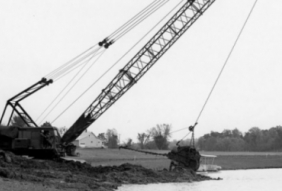
Posted on February 22, 2016
A Republican proposal to change how Wisconsin shoreline development is regulated has cleared the state Assembly.
Assembly lawmakers passed the bill Tuesday by a 57-39 vote. The measure changes how the state’s Department of Natural Resources issues permits for shoreline development and loosens requirements for what property owners must provide the state to secure a permit. It also authorizes dredging along shorelines and alters the state’s Public Trust Doctrine, directing waters that once were governed by the state into the hands of private property owners.
Republicans said the bill strikes a balance; protecting the environment while empowering citizens and business owners to responsibly and more efficiently develop the land they own. Democrats, along with a slew of environmental groups, say the measure invites shoreline degradation and puts fish and wildlife habitats at risk statewide.
“This is Act 10 for Wisconsin lakes…” said Rep. Cory Mason, D-Racine. “This is the worst bill for the environment in this session.”
That’s hyperbole, Assembly Republicans said. The bill’s aim is to cut needless regulations that prevent citizens and local governments from responsibly developing the land, not destroying the environment, said Rep. Adam Jarchow, R-Balsam Lake, who authored the bill.
“If I thought for a second we were going to harm fish habitat I would be adamantly opposed to this bill,” he said.
Jarchow said he made several changes to the bill after listening to the concerns of environmental groups. The groups highlighted the bill’s dredging provision as a chief concern. The bill prohibits dredging for areas deemed sensitive by the DNR, but allows for all others.
Scraping the bottom of lake and river beds just off the shore could destroy habitats where fish often feed and grow, environmental groups have said.
The bill also changes the permit classification for developing shorelines. Shoreline development currently falls under a specialized, individual permit from the state Department of Natural Resources. The bill moves shoreline development to a general permit classification, which critics say ultimately loosens state oversight.
The DNR still has the authority to reject a general permit request to develop a shoreline, though the agency is prohibited from requiring a potential developer to submit a soil sample so it can check for toxins.
The agency can enact conditions that help protect sensitive shorelines, Jarchow said.
“The DNR always has the authority and ability to impose additional conditions on a general permit,” he said.
The bill has received widespread criticism from dozens of environmental conservation associations including the League of Conservation Voters, Sierra Club, Ducks Unlimited, Nature Conservancy, Wisconsin Association of Lakes, and the River Alliance of Wisconsin.
Assembly Democrats spoke vehemently against the measure, casting it as a legislative invitation to over-develop the state’s shorelines and destroy fish and wildlife habitats that grow on the outskirts of lakes and rivers.
“This bill will not only affect property owners across the state, it will affect everybody who drives north in the summers to fish and have a good times with their families,” said Assembly Minority Leader Rep. Katrina Shankland, D-Stevens Point.
The measure upends the state’s legacy of environmental conservation, said Rep. Chris Danou-D-Trempealeau.
“This is the state that produced John Muir, Also Leopold, Gaylord Nelson…This bill is a direct attack on that value and legacy,” Danou said. “This is going to be one of the worse decisions the state makes.”
Local government and development associations including the League of Wisconsin Municipalities, Wisconsin Towns Association and the Wisconsin Chapter of the Commercial Real Estate Development Association, Wisconsin Builders Association and Wisconsin Realtors Association lobbied for the legislation.
“This will help cut red tape in permitting processes for ditches and storm water retention,” Jarchow said.
The bill also defines the shoreline zone as the area that is three feet from the land or the depth generally needed to use a boat lift on the water. It also preserves shoreline zones if they have been used by the public since January 1, 2016, ordering that they be set aside for public use.
The bill now goes to the Senate for consideration. The Senate would have to approve the bill before it could be signed by Gov. Scott Walker and become law.





